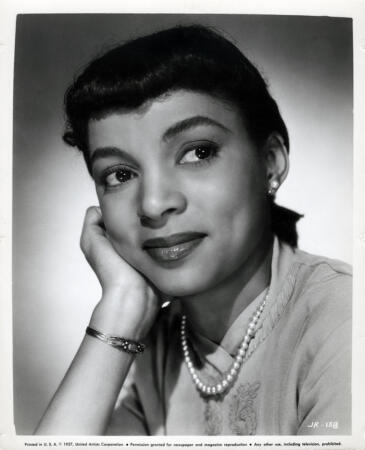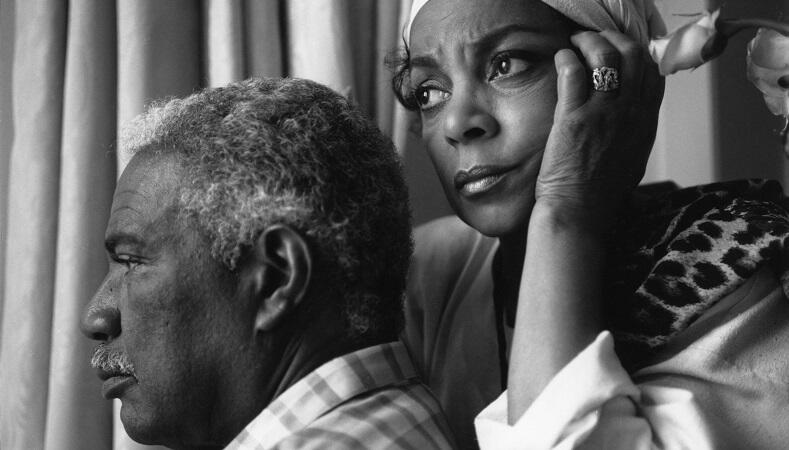
Looking back at an artist’s career that spans more than sixty years is a tall order. The late Ruby Dee (1922-2014) tended her characters in a way that accessed their humanity – as all actors ought to do – but at a time when black characters weren’t given three-dimensional material especially for black women who were mostly being offered roles lacking in complexity, stereotypes mostly. Film and theater historians will likely have to duke it out as to which category best suits Ms. Dee as she worked in film, television, and on the stage. And yet it was Dee’s theater impulses that came to bear whether the cameras were recording or not. Ruby Dee along with her husband, Ossie Davis, also an actor and creative collaborator, worked in Hollywood at different times of their careers, but were never a part of the scene. They were true thespians, writers, armchair intellectuals, social activists – successors to Paul Robeson.
A quiet powerhouse: Ms. Dee was instrumental in helping Alex Haley get his famous family saga, “Roots,” on television. Memorable films that define Ms. Dee’s range as an actor and performer include “A Raisin in the Sun,” “Buck and Preacher,” “Purlie Victorious,” and her television series on PBS, “With Ruby and Ossie,” to name a few. What’s so remarkable about Dee’s career is the fact that she stayed culturally relevant and working throughout her entire life. This hasn’t been the case for black actors of her generation, let alone black actresses. In Ms. Dee’s able hands, we have a finely crafted collection of black women who possess nuance and all of the colors of humanity delivered as only she could.
In her New York Times obit, the writer Bruce Weber said, “she was always a critical favorite, though not often cast as a leading lady.”
While this is technically true, Ms. Dee’s screen time – whether for five minutes or 30 seconds – always managed to eclipse the performances of her co-stars. The question of why Ms. Dee was never cast as a leading lady is an interesting one. Perhaps Ms. Dee found more freedom in being a character actor; playing unforgettable women who steal the scene. I’m reminded of the moment in “American Gangster” (2007) when Ruby Dee slaps Denzel Washington. Who could say that Ms. Dee did not own that scene, or any of the others?
Here are some highlights from Ms. Dee’s filmography that anoints her as a supporting actor who “leads” – all titles you should watch:
“A Raisin in the Sun” (1961)
The play that integrated Broadway also happens to be the role that brought Ms. Dee to a mainstream audience and for which she will mostly be remembered. The character of Ruth Younger (the wife of Walter Lee played by Sidney Poitier) is overburdened and heavy with longing. Ruby Dee captures all of the nuances of this character in a way that inspires empathy from the audience. A few years after “Raisin” debuted on Broadway it became a Hollywood film, starring the same ensemble cast.
“Buck and Preacher” (1972)
It’s the end of the Civil War. Black folks on horses with guns traveling West with newly freed African Americans. This is a classic and a required watching before “Django.” Ruby Dee delivers another scene stealing performance here, without uttering a single word.

“With Ossie and Ruby” (1980)
This PBS variety show is a lesser-known gem in Ruby’s body of work, co-hosted with her husband Ossie Davis. The performances, poetry readings and interviews were unscripted. It is apparent that many of her guests were either personal friends or artists she admired. Check out her show with Gil Scott-Heron, Odetta, and her reading of Carolyn Rodger’s poem “When the Revolution Came.” Here we get a glimpse of Ruby Dee as not only a lover of poetry but a solid poet herself.
“Do the Right Thing” (1989)
Ruby Dee plays a minor role, Mother Sister, in Spike Lee’s groundbreaking “Do the Right Thing.” The film, heavily influenced by Greek Tragedy, happens in a day, the hottest day of the summer, where racial tensions come to a crescendo. Mother Sister’s temperamental, hard-to-get counterpoint to The Mayor (Ossie Davis) introduces these two legends to a new generation of film. Mother-Sister appears callous. Perhaps, even broken but is a part of the bustling tight-knitted community. In Mother-Sister’s character we have a prototype for everyday black women elders in the community who keep an eye out from their window to ensure that negative elements stay at a distance.
“Jungle Fever” (1991)
Ms. Dee makes another appearance in the growing cannon of Spike Lee’s film about Black New York in “Jungle Fever.” Dee plays Lucinda Purify, the loving wife of The Good Reverend Doctor Purify (played by Ossie Davis), and mother of Gator Purify (Samuel L. Jackson) and Fliper Purify (Wesley Snipes). Although Ms. Dee takes up a relatively short amount of screen time, she performs without fail an elderly black mother who would do anything for her drug-addicted son, Gator. Without doubt, Spike Lee makes a critique on both the parents who seems to have failed their son, Gator.
“Having Our Say” (1999)
In 1999 Ruby Dee co-stars with Diahann Carroll with the made-for-TV adaptation of the memoir “Having Our Say,” a chronicle of two sisters who live to be over 100 years old and in their stories we learn a fascinating uplift story of the African American family. It’s difficult not to believe that Diahann Carroll and Ruby Dee at some point in their careers were rivals as there were so few roles for black actors when Ruby Dee was starting out. And yet this film brings these two legendary women together. The careers of Ruby Dee and Diahann Carroll could be the subject of a dissertation. These two actresses were both doing recovery work of the image of the black woman in many of the roles that they chose in quite different ways.
“American Gangster” (2007)
One of the realities for most actresses over a certain age – of any color – is that they will age into playing mostly somebody’s mother, typically without any dimension or backstory. Throughout most of Ruby Dee’s career, she played the suffering wife, much to her chagrin. Nevertheless, at the ripe age of 85, Ruby Dee gave a brilliant performance as the mother of Frank Lucas (Denzel Washington) in “American Gangster” for which she was nominated for an Academy Award. Watch how she steals the scene, slapping Denzel Washington, making the entire audience sit up straight in their seats.
What will be Ms. Dee’s Legacy?
Undoubtedly Ruby Dee has made her impression on generations of actors, performers, and social activists. If I were a betting man, I’d say Audra McDonald is her true heir. She’s played a younger Ruby Dee in “Having Our Say” (1999) and is almost identical in terms of theatricality when winning awards. What most heartening to know is that Ruby Dee, like her husband, weren’t the Hollywood kind of black stars, their feet were always grounded in causes and community.
Take a look at this clip of Iconoclasts where Alicia Keys interviews Ruby Dee.
Abdul Ali is a culture critic who lives in Baltimore. Find him on Twitter here.
